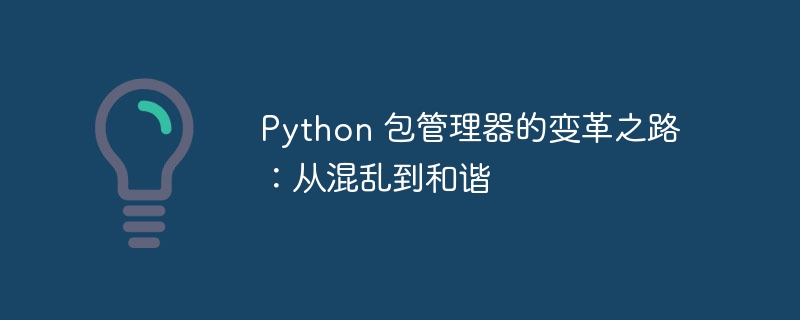

#python Package managers have gone through a journey of change from chaos to harmony. In the early days, many package managers coexisted, causing confusion and version conflicts. With the emergence and continuous maturity of Pip, Python package management is gradually becoming unified and stable.
Early Chaos
In the early days of Python, there was a lack of a standardized package management system. Developers created their own package managers, causing confusion and compatibility issues. Some popular package managers include EasyInstall, Setuptools, and Distribute.
The Rise of Pip
In 2011, the Python Packaging Authority (PyPA) released the Pip package manager. Pip provides a unified way to install, uninstall, and manage dependencies for Python. It is based on setuptools and is widely adopted as the de facto package manager for Python.
Unity and Stability
The emergence of Pip simplifies Python package management. It unifies the package installation and management process, reducing version conflicts and compatibility issues. Pip also introduced the concept of virtual environments, allowing developers to isolate different Python environments and dependencies.
Version Management
Pip 10 version introduces new version management features. It introduces a new dependency specification syntax, called PEP 508, for specifying precise version ranges of dependencies. This improves the stability and predictability of package dependencies.
Pipenv
Pipenv is a package manager built on top of Pip. It provides a centralized tool for managing virtual environments and dependencies. Pipenv does this by creating and managing a Pipfile that specifies package dependencies and virtual environment configuration.
Other package managers
In addition to Pip and Pipenv, there are other package managers such as Conda and Poetry. Conda is used to manage packages in the Anaconda distribution, while Poetry focuses on creating and publishing Python packages.
Current status
Currently, Pip is still the main package manager for Python, but tools such as Pipenv and Poetry provide some additional features and improvements. Python package management has reached a high level of maturity, providing Python developers with a unified, stable, and predictable package management experience.
Future Outlook
The field of Python package management is constantly evolving. PyPA is actively developing Pip and related tools to address emerging needs. In the future, we may see further standardization and integration, as well as support for new features and technologies.
The above is the detailed content of The road to change in the Python package manager: from chaos to harmony. For more information, please follow other related articles on the PHP Chinese website!




